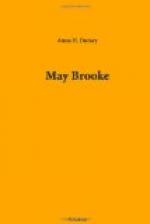And so May was blamed for the loss of the will. Grieving more for the solid benefits which were lost to the poor and destitute,—for the alms which would have sent up incense to heaven in behalf of the soul of the giver,—May thought not of herself, only so far as to vow her energies, her labors, her life, to the good of those who, through her heedlessness, had been injured. She was not clear that she did not burn the will; she thought she had not done so, but she would not, for the world, have taken an oath to that effect. It is not to be supposed, however, that so shrewd a man as Mr. Fielding, and a man so experienced in all the devious and sinuous windings of the human heart as Father Fabian, were without their suspicions, but the one through policy, and the other through charity, forebore to express in words what they were not prepared to prove by legal facts.
May kept her plans to herself, and in her matter-of-fact way set the house in order, and arranged, day after day, every article in its particular place; and was scrupulously exact that not a scrap of old lumber, cracked china, broken spoons, or half-worn linen, should be missing on the day of the sale. Helen, quite unconcerned about such homely matters, dashed about in Mrs. Jerrold’s carriage from morning until night, making splendid purchases, and indulged in all those expensive tastes which her natural love for the beautiful, and her undisciplined will, made so necessary to her happiness. Happiness! Could she in whose soul the poison of a hidden sin was already doing its work of restless fever, and unceasing torture, be happy? Alas! no; she felt that hence forth she was to know not rest on earth—beyond, she dared not look.
One evening—the eve of her bridal, she and May were together, once more, in the antique parlor. Helen, flushed, and splendidly beautiful;—May, calm, and pleasant, her cheeks and brow a little pale, but very lovely from the inner light reflected on them.
“May, are you still determined not to witness my marriage?” asked Helen, abruptly.
“Yes, Helen. The same barrier to my being present exists, I presume?”
“If my being married by a Protestant minister, is the apology for your absence, it does,” replied Helen, with a decided air.
“Do not say apology, Helen; I do not pretend to offer one. It is your privilege to make your marriage, as far as you are concerned, sacramental; as a Catholic, it is your duty to do so. By acting otherwise, you disobey the Church, and place yourself in a position of great danger; and I do not choose to be implicated, by being present at the ceremonial.”
“You are a most obstinate person;—but just as you please. What are your plans, if I may ask?” said Helen, feeling ill at ease.
“Very plain and honest ones, Helen,” said May, measuring out the tea.
“I should not suspect you, May, of any other,” said Helen, with a sarcastic manner; “but let us hear them, if you are not ashamed of them!”




